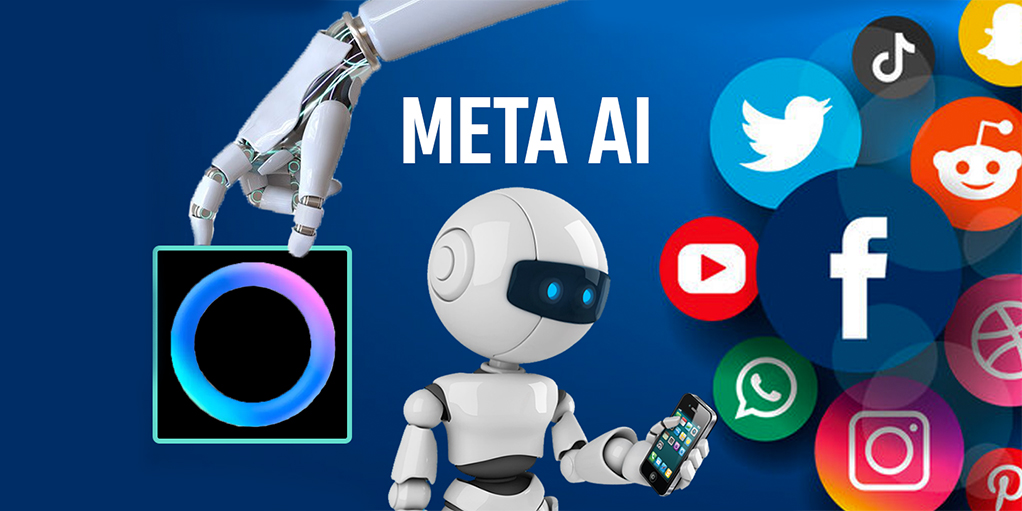In the rapidly evolving world of social media, artificial intelligence (AI) has become a game changer. Meta, formerly known as Facebook, has been at the forefront of using AI to enhance and reshape how users engage with content, businesses, and each other on its platforms. With billions of users across Facebook, Instagram, WhatsApp, and Messenger, Meta leverages AI innovations to deliver more personalized, engaging, and relevant experiences.
In this blog, we will explore how Meta’s AI innovations are transforming social media algorithms and enhancing user experiences, shaping the future of digital interaction.
- Personalization Through AI Algorithms :
One of Meta’s most significant AI innovations is its ability to personalize content for each user. AI algorithms analyze vast amounts of data, including user behaviour, preferences, and interactions, to tailor content recommendations and prioritize what users see in their feeds.
- News Feed Optimization: Meta’s AI-powered news feed algorithms on platforms like Facebook and Instagram are designed to show users posts that are most relevant to them. The AI analyzes factors such as the types of content users engage with (e.g., videos, images, stories), who they interact with most, and the recency of posts. This personalization ensures that users spend more time engaging with meaningful content, creating a more immersive experience.
- Content Recommendations: On Instagram and Facebook, AI algorithms analyze users’ past behaviours to recommend posts, Reels, and Stories from accounts they may not follow but are likely to be interested in. These recommendations are based on factors such as likes, shares, and even comments, ensuring users continuously discover fresh and relevant content.
By enhancing the ability to deliver highly personalized content, Meta keeps users engaged longer, improving the overall social media experience.
- Enhanced Content Moderation Using AI :
Managing inappropriate, harmful, or misleading content has become a critical issue with the increasing amount of content being shared on Meta’s platforms. AI is crucial in content moderation, helping Meta detect and effectively remove harmful posts.
- Automated Content Filtering: Meta’s AI systems are trained to detect and filter out hate speech, misinformation, violent content, and other violations of community standards. This is done through natural language processing (NLP) algorithms that can understand the context of text and computer vision systems that can recognize images and videos that violate platform policies.
- Proactive Moderation: AI algorithms can proactively detect and remove problematic content before users report it. For example, Meta uses AI to scan posts for signs of cyberbullying, harassment, and abusive behaviour, reducing the impact of harmful content on its platforms.
- Misinformation Detection: In collaboration with fact-checkers, Meta uses AI to identify and flag misinformation, particularly related to sensitive topics such as elections, health (e.g., COVID-19), and public safety. AI-powered systems analyze the spread of content, monitor for false claims, and warn users when they’re about to share something deemed inaccurate.
By automating content moderation processes with AI, Meta ensures a safer and more positive user experience while also easing the workload on human moderators.
- AI-Powered Visual and Voice Recognition :
Meta also makes strides in visual and voice recognition technologies, allowing for more seamless platform interactions. These innovations improve how users engage with media content, from images and videos to voice commands.
- Computer Vision for Image and Video Search: Meta’s AI systems use computer vision technology to analyze and categorize visual content. This enables users to search for specific photos or videos based on the objects or people within them, even if the content isn’t explicitly tagged. For instance, if you’re searching for pictures of a specific event or person, Meta’s AI can recognize the details in images and bring up relevant results with incredible accuracy.
- Voice Commands and Assistants: AI-powered voice recognition allows users to interact with Meta’s platforms using natural language commands. This is evident in tools like Facebook Portal, where users can control their devices and initiate video calls using voice commands. Additionally, Meta is working on expanding its voice technologies to improve accessibility, allowing users with disabilities to interact with content more easily.
AI-driven recognition tools are making interactions with media content on Meta’s platforms faster, more intuitive, and user-friendly, enhancing the overall experience for various users.
- Dynamic Ads and Personalized Marketing :
Meta’s AI innovations aren’t just limited to user experience—they are also revolutionizing how businesses approach digital marketing on their platforms. Using AI to deliver highly targeted and dynamic ads, Meta helps companies reach the right audiences at the right time.
- Dynamic Ads: Meta’s AI-powered dynamic ads automatically tailor advertisements to individual users based on their browsing behaviour, past purchases, and interests. For example, suppose a user browses products on an e-commerce website but needs to complete a purchase. In that case, Meta’s AI can retarget them with ads showcasing those products, encouraging them to complete the transaction. This personalized approach significantly increases the likelihood of conversion.
- Audience Targeting: AI enables businesses to identify and target specific audience segments effectively. Through tools like Lookalike Audiences, Meta’s algorithms can analyze the characteristics of a business’s best customers and find new users who exhibit similar traits, behaviours, and preferences. This allows companies to expand their reach and connect with potential customers most likely to engage with their products or services.
Meta’s AI-driven marketing solutions help businesses achieve higher return on investment (ROI) by delivering more relevant ads to users, improving the advertising experience.
- AI-Driven Virtual and Augmented Reality Experiences :
Meta’s ambition to lead in the metaverse heavily relies on AI innovations, particularly in virtual reality (VR) and augmented reality (AR). AI is crucial in creating immersive digital environments where users can interact with each other and virtual objects in real time.
- AI-Powered Avatars: In Meta’s metaverse vision, AI creates realistic 3D avatars that mimic users’ real-world movements and expressions. Through AI-driven motion tracking and machine learning models, avatars can be personalized and used in virtual workspaces, social gatherings, or gaming environments.
- AR Filters and Effects: Meta’s AR technology, driven by AI, allows users to overlay digital elements in the real world. Instagram’s AR filters and Facebook’s camera effects are famous examples where AI-powered algorithms track facial movements and gestures in real time, allowing users to apply creative filters, animations, and effects seamlessly.
By integrating AI with VR and AR technologies, Meta sets the stage for more interactive, immersive social media experiences, blurring the lines between the physical and digital worlds.
Conclusion: The Future of AI and Social Media with Meta
Meta’s AI innovations are revolutionizing the social media experience by making content more personalized, moderating harmful material, improving visual and voice interactions, enhancing advertising strategies, and powering virtual reality environments. As Meta continues to invest in AI technology, the future of social media promises to be even more interactive, immersive, and user-centric.
As AI evolves, Meta’s platforms will likely become more intuitive and capable of understanding and predicting user behaviour, creating a more seamless and dynamic experience for users and businesses. From transforming how we interact with content to shaping the future of virtual communication, Meta’s AI innovations are playing a critical role in defining the next era of social media.
To know more about Digital Marketing, Please visit https://paypercampaign.com





